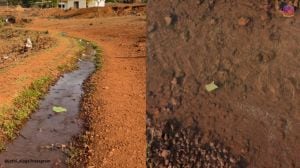- India
- International
Ratnagiri: Carcass of 57-ft Bryde’s whale washes ashore
Between 2015 and 2018, 88 beaching incidents have been reported, with 32 recorded in 2018 alone.
 The cause of the mammal’s death could not be ascertained.
The cause of the mammal’s death could not be ascertained.
The carcass of a 57-foot Bryde’s whale washed ashore Murud beach in Ratnagiri district Wednesday morning, forest department officials said. The mammal, which was in a decomposed state, was buried at the beach later in the afternoon, they said.
Bryde’s whale is a tropical whale and is usually found in warmer waters of the Pacific, Indian and Atlantic oceans. India, so far, has not undertaken much research on the species.
“The carcass of the whale was intact, however, it was in an advanced state of decomposition because of which postmortem was not possible. It was in a putrefied state and opening up the carcass was not recommended due to health risks. We have taken genetic samples through tissues. The whale was buried at the beach itself,” Neenu Somraj, deputy conservator of forests, Maharashtra Mangrove foundation, said.
While the cause of the mammal’s death could not be ascertained, experts suspect that rise in shipping activity could have led to the deaths of some marine animals. Between 2015 and 2018, 88 beaching incidents have been reported, with 32 recorded in 2018 alone.
While carcasses of several marine animals, including dolphin, porpoise, turtle and whale, have been found along Konkan coast, the cause of their death has mostly remained unclear. In most cases, by the time the forest department responds to the incident, the animal’s body is decomposed, which makes postmortem impossible.

“If a dead whale or any other species is found on the beach, it doesn’t mean it died there. Various factors are involved like where the cetacean is usually found, the buoyancy of the carcass, current flow, wind flow and tide among others. Investigating beaching is a complex study and requires decades of data,” said Mihir Sule, a marine biologist and researcher at Indian Institute of Science, Bengaluru (IISC).
Cetacean stranding, commonly known as beaching, is a phenomenon in which whales and dolphins, among others, get stranded on land, usually on a beach.
In January last year, two cases of dolphin strandings were reported at Girgaum Chowpatty and Worli in Mumbai each, while in March, a 10-foot carcass of a baby whale shark with dismembered fins was found in Mahul creek and a 150-kg decomposed carcass of a green turtle washed ashore at a popular seaside spot in Mumbai’s Nariman Point.
In October, the state forest department began a five-year study to enquire and investigate cases of beaching across the state’s coastline. The study will include threats and behaviour of marine animals.
Apr 26: Latest News
- 01
- 02
- 03
- 04
- 05








































